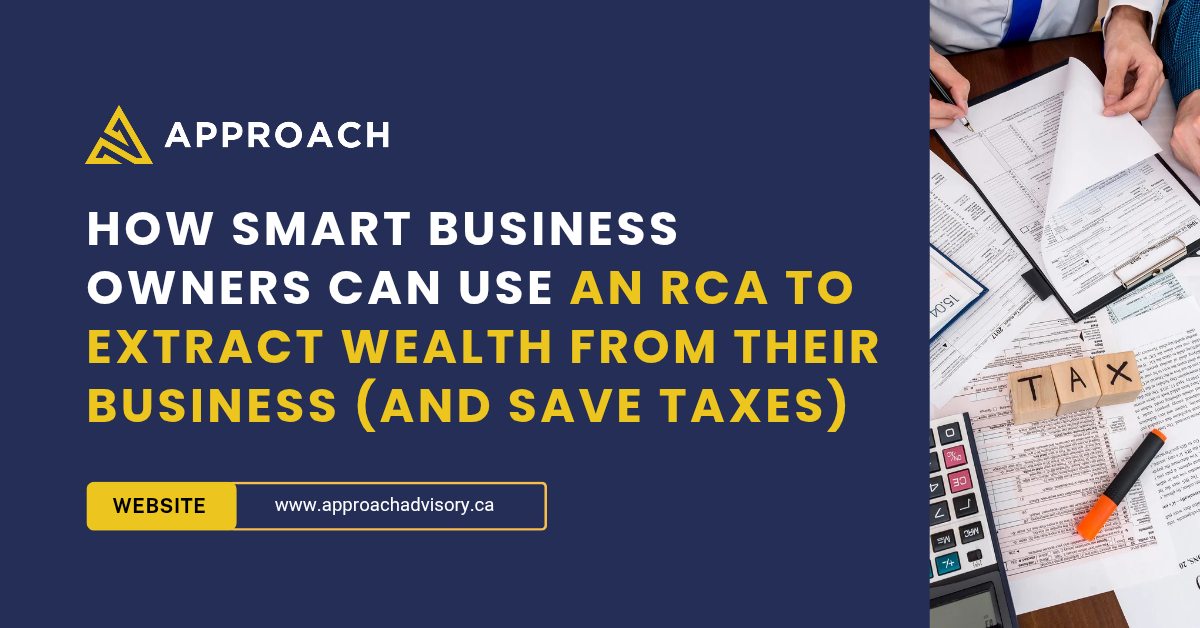How Smart Business Owners Can Use an RCA to Extract Wealth from Their Business (and Save Taxes)

When it comes to drawing money out of a corporation, most small business owners think in terms of salaries, dividends, or capital gains.
But there’s another, often overlooked option that can provide significant tax advantages—especially when you’re transitioning out of your business or stepping back from day-to-day operations.
It’s called a Retirement Compensation Arrangement (RCA).
So, what exactly is an RCA? And why should business owners care?
What Is an RCA?
A Retirement Compensation Arrangement (RCA) is a type of investment account designed to provide retirement income for business owners and high-earning executives.
It’s particularly useful for situations where a large lump-sum payment—like a severance or retirement payout—is involved.
Here’s how it works: instead of the business paying the severance or retirement compensation directly to the individual (which would typically be taxed at the full marginal rate—potentially 50% or more), the company contributes that amount into an RCA.
Half of the funds go into a government-held trust account (with no return or interest).
The other half is placed into a managed investment account, which can grow over time.
Every year, there’s an equalization process between the government and investment sides of the RCA.
If the investments perform well and grow in value, funds are transferred to the government side to maintain the 50/50 balance—and vice versa.
The result is that the investment growth inside the RCA is not immediately taxed, allowing the account to grow tax-deferred.
When Should Small Business Owners Consider Using an RCA?
If you’re a business owner planning a transition—whether that’s stepping back from day-to-day operations, selling your company, or simply taking some time off—an RCA can be a powerful planning tool.
Let’s say your business could afford to pay you a large severance as you wind things down.
Without an RCA, you’d likely pay personal tax on the entire amount in the year it’s received. But with an RCA, you can instead draw the funds gradually over time as you need them for your lifestyle.
For example, if your RCA holds $1 million and you only withdraw $200,000 in a given year, you’ll only be taxed on that $200,000—at your personal tax rate. The remaining funds stay invested and continue growing on a tax-deferred basis.
That kind of deferral and income control can result in significant tax savings.
A Strategic Tool in Your Exit Plan
An RCA isn’t just about reducing taxes. It’s about giving you control over your income, particularly during periods of transition or semi-retirement.
It also complements other tax planning tools available to business owners, like the Lifetime Capital Gains Exemption (LCGE) when selling qualifying shares.
Used strategically, an RCA can help you:
- Extract large sums from your corporation in a tax-efficient way
- Smooth your personal income over several years, reducing overall tax burden
- Defer taxes while your funds continue to grow in a professionally managed account
- Bridge the income gap between business exit and retirement or your next project
Is an RCA Right for You?
RCAs are most useful for business owners with high retained earnings and those looking to exit or restructure their involvement in the business.
They require professional setup and ongoing management, but the long-term tax advantages often far outweigh the costs.
If you’re considering a business transition—or just want more control over how you draw income from your corporation—let’s talk!
Click this link and scroll to ‘Schedule a Coffee Meeting with Fraser’ to book a free strategy call and we’ll discuss how you could potentially set up an RCA for your own future and save thousands of dollars of tax. We will also give you an RCA strategy guide and a sample plan.

Your first step is a free consultation call to see if we’re a good fit to work together. Click the button to set up a time I’m looking forward to meeting you!
